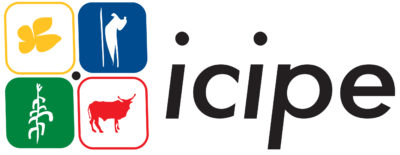New JRS Grant Will Help Illuminate Pollinator-Plant Interactions in Sub-Saharan Africa
International Centre of Insect Physiology and Ecology (2017)
Integrative Pollinator-Plant Interaction Assessment of Ecosystem Service Diversity in Sub-Saharan Africa
Project Details
Project News
Last Updated: February 2nd, 2023
Background
 Pollination is an essential ecosystem service promoting biodiversity and ensuring food security and poverty reduction through farm incomes. Unfortunately, pollinator populations are being lost worldwide due to the destruction of natural habitats and the use of chemical insecticides in agriculture. In East Africa, where the livelihood of millions of rural families depends on agriculture, there is an urgent need for scientifically sound and practical strategies for pollinator conservation.
Pollination is an essential ecosystem service promoting biodiversity and ensuring food security and poverty reduction through farm incomes. Unfortunately, pollinator populations are being lost worldwide due to the destruction of natural habitats and the use of chemical insecticides in agriculture. In East Africa, where the livelihood of millions of rural families depends on agriculture, there is an urgent need for scientifically sound and practical strategies for pollinator conservation.
An effective pollinator management strategy must take into account interactions between pollinators and plants present in the community, however, little attention has been paid to this area of research. The associations between plants and their pollinators are governed by complex interactions that are vulnerable to ecosystem change, and their alteration can have significant multiplier effects in biodiversity loss. A major problem for biodiversity conservation in Africa is the lack of knowledge on pollinator diversity and distribution at local or even regional level. Available information and data are weak and often scattered in specialized publications and project reports. This project aims to improve existing information and make data easily accessible by establishing a public database containing pollinator-plant interaction records.
Key Objectives and Activities
The Integrative Plant-Pollinator Assessment project seeks to develop, implement, and populate an open access database to better document and understand plant-pollinator interactions, biodiversity, and function. Project objectives are to:
- Set up and deploy the open access African Plant Pollinator Interaction (APPI) database.
- Collect and curate baseline plant-pollinator interaction data across Eastern Africa.
- Collect interaction records of plants and their natural pollinators (bees) for forest and agricultural habitats in the Eastern Afromontane Biodiversity Hotspot (EABH).
- Develop a standard for interaction data that conforms to Darwin Core standards.
- Leverage aggregated data for species distribution modeling (SDM).
- Train ICIPE staff in database management, host workshops to train stakeholders in use of APPI database.
Video Progress Update, May 2020
With COVID-19 restricting travel and meeting with our grantees, JRS invited our projects to submit a short update for the JRS Board of Trustees. Though intended for an internal JRS audience, we loved these videos and share them here with permission. Enjoy!
Planned Outputs
- An information system that enhances access to baseline biodiversity data and accepts new biodiversity data.
- Inclusion of ICIPE baseline data (>15,000 field records, >5,000 literature or museum records) into the APPI database.
- Inclusion of either ten small (<100 interaction records) or three large (>100 interaction records) external datasets into APPI database.
- A data structure for capturing, aggregating, and displaying species interaction data conforming to Darwin Core standards.
- At least two ICIPE staff trained at the beginning of the project to maintain the APPI database.
- Aggregated data used in SDM research to predict pollinator occurrence in remote areas. Empirical verification aims at a recovery of the species at rates higher or equal to the probability predicted by SDM.
Planned Outcomes
This project will increase availability of relevant, high-quality biodiversity information to facilitate research, planning, and decision-making processes by scientists, civil servants, and policymakers. Analysis of pollinator-plant interactions will allow policymakers to focus on and administer conservation activities more precisely. This is especially important for addressing effects of ongoing climate change on pollinator-plant interactions, and will allow for more informed conservation strategies to maintain biodiversity and food security. Also, through capacity building activities, and by creating a platform for ongoing data collection and sharing, this project will foster a multi-disciplinary network of scientists and researchers that can collaborate to increase understanding of pollinator-plant interactions.
Results to Date
- Two PhD students have been recruited, and funding has been secured from the German Academic Exchange (DAAD) through the post-graduate research support, ARPPIS Program at ICIPE.
- Field surveys are underway and have produced a dataset of 319 interaction data from Muranga, Aberdare range in Kenya.
- Existing interaction databases have been reviewed, and scientists in Brazil have been contacted for knowledge exchange.
Project Director Biography
Dr. Michael Lattorff is Senior Scientist of the Environmental Health Theme (EHT) at the International Centre of Insect Physiology and Ecology. Dr. Lattorff is involved in bee research for the past 17 years. He has led several projects on bee genetics and diversity. He has published 39 research articles (16 within the past 5 years) in peer-reviewed journals like Nature, Genome Biology and Trends in Genetics. Prior to his employment at ICIPE, he held positions as Assistant Professor in Molecular Ecology and as Professor for Animal Physiology at Martin-Luther-University Halle-Wittenberg, Germany.
Notes from JRS
The award to ICIPE contributes to a growing constellation of JRS awards in East Africa that work to create richer data sets and information platforms as part of JRS’ program on Pollinator Biodiversity and Services. This grant is the second in our Pollinator Program to explicitly consider plant-pollinator interactions, and the third to conduct work in the Eastern Afromontane Biodiversity Hotspot. Additionally, the project team includes partners from Upande, which previously partnered with the African Conservation Centre on a JRS funded grant developing the Biodiversity Atlas of Kenya. Upande partners will provide technical assistance by completing the data architecture and design for the APPI database. Through these connections, JRS hopes that the project will catalyze a network of scientists and institution interested in pollinator biodiversity that can be a hub for future work.
